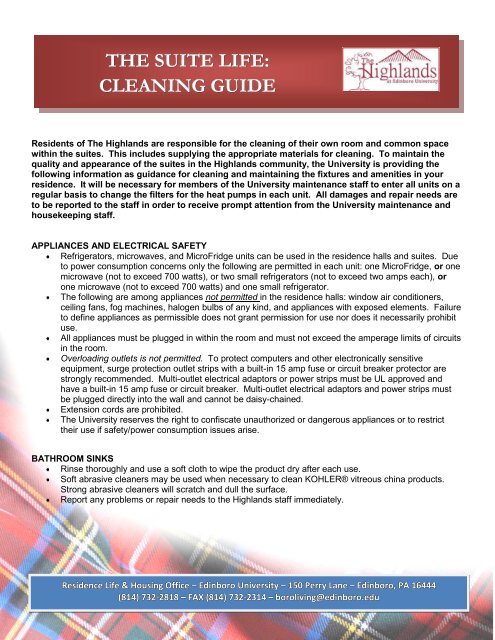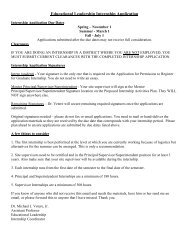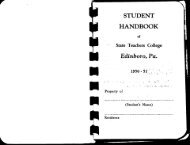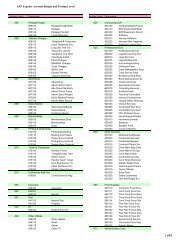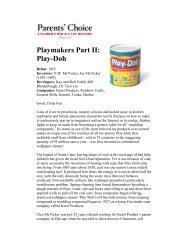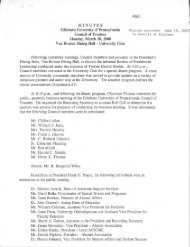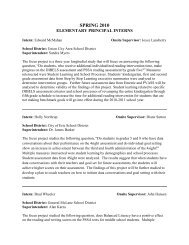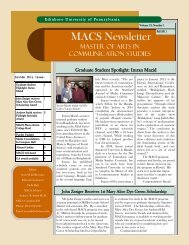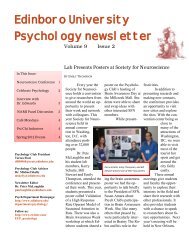cleaning guide - Edinboro University
cleaning guide - Edinboro University
cleaning guide - Edinboro University
Create successful ePaper yourself
Turn your PDF publications into a flip-book with our unique Google optimized e-Paper software.
THE SUITE LIFE:<br />
CLEANING GUIDE<br />
Residents of The Highlands are responsible for the <strong>cleaning</strong> of their own room and common space<br />
within the suites. This includes supplying the appropriate materials for <strong>cleaning</strong>. To maintain the<br />
quality and appearance of the suites in the Highlands community, the <strong>University</strong> is providing the<br />
following information as guidance for <strong>cleaning</strong> and maintaining the fixtures and amenities in your<br />
residence. It will be necessary for members of the <strong>University</strong> maintenance staff to enter all units on a<br />
regular basis to change the filters for the heat pumps in each unit. All damages and repair needs are<br />
to be reported to the staff in order to receive prompt attention from the <strong>University</strong> maintenance and<br />
housekeeping staff.<br />
APPLIANCES AND ELECTRICAL SAFETY<br />
Refrigerators, microwaves, and MicroFridge units can be used in the residence halls and suites. Due<br />
to power consumption concerns only the following are permitted in each unit: one MicroFridge, or one<br />
microwave (not to exceed 700 watts), or two small refrigerators (not to exceed two amps each), or<br />
one microwave (not to exceed 700 watts) and one small refrigerator.<br />
The following are among appliances not permitted in the residence halls: window air conditioners,<br />
ceiling fans, fog machines, halogen bulbs of any kind, and appliances with exposed elements. Failure<br />
to define appliances as permissible does not grant permission for use nor does it necessarily prohibit<br />
use.<br />
All appliances must be plugged in within the room and must not exceed the amperage limits of circuits<br />
in the room.<br />
Overloading outlets is not permitted. To protect computers and other electronically sensitive<br />
equipment, surge protection outlet strips with a built-in 15 amp fuse or circuit breaker protector are<br />
strongly recommended. Multi-outlet electrical adaptors or power strips must be UL approved and<br />
have a built-in 15 amp fuse or circuit breaker. Multi-outlet electrical adaptors and power strips must<br />
be plugged directly into the wall and cannot be daisy-chained.<br />
Extension cords are prohibited.<br />
The <strong>University</strong> reserves the right to confiscate unauthorized or dangerous appliances or to restrict<br />
their use if safety/power consumption issues arise.<br />
BATHROOM SINKS<br />
Rinse thoroughly and use a soft cloth to wipe the product dry after each use.<br />
Soft abrasive cleaners may be used when necessary to clean KOHLER® vitreous china products.<br />
Strong abrasive cleaners will scratch and dull the surface.<br />
Report any problems or repair needs to the Highlands staff immediately.<br />
Residence Life & Housing Office – <strong>Edinboro</strong> <strong>University</strong> – 150 Perry Lane – <strong>Edinboro</strong>, PA 16444<br />
(814) 732-2818<br />
2818 – FAX (814) 732-2314<br />
2314 – boroliving@edinboro.edu
CABINETS<br />
To remove stubborn dirt, wash around all handles and any other grease zones first with hand dishwashing<br />
detergent. Then wash the entire cabinet, including the handle areas, with an oil soap solution. Just wipe<br />
lightly with the solution and buff dry immediately with a terry <strong>cleaning</strong> cloth. Always wipe dry with any grain<br />
or pattern. Seldom do you need to add any polish because the surface has its own sheen when clean. If<br />
your cabinets are dull from wear or age, spray furniture polish very lightly once a year or so to fill in the<br />
pores and bring back some life.<br />
CARPET<br />
If you enjoy going barefoot, or even if you don't, kick your shoes off at the door. Why remove your<br />
shoes? If you have a rough board that needs smoothing, you grab a sheet of sandpaper for the job.<br />
Guess what's on the bottom of your shoes? Sand and dirt grind away at the fibers in your carpet,<br />
leading to an early death.<br />
Take a closer look at the bottoms of those shoes and you'll find oil, dirt and heaven only knows how<br />
many bits of leftover dog deposits. Small wonder why your carpet stubbornly refuses to come clean.<br />
Do wear slippers or socks inside. The oil from the bottom of your feet also dirties the carpet.<br />
Vacuum your carpet regularly, and do not use liquid carpet shampoos to clean them. Ever wash your<br />
hair and forget to rinse out all the shampoo? The same thing happens to your carpet. The shampoo<br />
can't be completely rinsed out, leaving a sticky residue. That residue acts like a big magnet pulling the<br />
dirt from the bottom of your shoes. Now you have clean shoes and even dirtier carpets. Use dry carpet<br />
cleaners instead. Stores selling vacuum cleaners carry dry carpet cleaners.<br />
Stains in carpet can be a hassle to remove. Never rub a stain, just blot. Rubbing breaks down the fibers<br />
and spreads the stain. Remove most food stains with shaving cream. Spray on and resist the<br />
temptation to rub it in, and then let it set for 15 minutes. Rinse with a vinegar and water solution.<br />
Housekeeping has carpet <strong>cleaning</strong> machines. Notify Residence Life if you have a heavily soiled area<br />
that needs to be cleaned and we will coordinate <strong>cleaning</strong> of the carpet with Housekeeping.<br />
COUNTERTOPS<br />
Never use abrasive cleansers or steel wool on laminate countertops.<br />
For general <strong>cleaning</strong>, a two-sided scrubbing pad with fiber on one side and a sponge on the other<br />
works particularly well. Moistened slightly with water, the fiber side is just abrasive enough to loosen<br />
greasy smears and other soil.<br />
Use hand dishwashing detergent and water to wipe off countertops daily.<br />
FAUCETS<br />
To ensure the long-lasting beauty of your faucets, we recommend that you use a mild soap solution<br />
and a soft cloth for <strong>cleaning</strong>. After <strong>cleaning</strong>, rinse and blot dry with a soft cloth. The use of abrasive or<br />
acid cleaners, polishes or solvents may permanently damage the finish.<br />
Report any problems or repair needs to the Highlands staff immediately.<br />
FURNITURE<br />
Sofas, chairs and loveseats: Use Water-Based Cleaner. Spot clean this fabric with the foam only of a<br />
water-based <strong>cleaning</strong> agent such as a mild detergent or commercial upholstery shampoo. Use sparingly.<br />
Avoid over-wetting.<br />
Case Goods: Any household cleaner such as Windex can be used on the metal and laminate parts of<br />
the product. Furniture polish should not be used on these parts. Furniture polish such as Pledge<br />
should be used for the wood surfaces on the chairs and dressers.
SHOWER SURROUND AND BATHTUB UNIT<br />
Abrasive cleaners may scratch and dull the surface of the unit. To clean the unit after installation, use<br />
warm water and one of the stronger liquid detergents, such as; Top Job, Liquid Ajax, or Mr. Clean.<br />
Use these liquid detergents for normal day-to-day <strong>cleaning</strong>.<br />
Plaster can be removed with a nylon or polypropylene scrubber. DO NOT USE steel wool, metal<br />
scraper, wire brushes, or other metal tools. One of the powder type detergents, such as Spic & Span,<br />
may be used on a damp cloth to provide mild abrasive action to remove residue plaster. Minor stains<br />
can be removed with a household strength ammonia or bleach. DO NOT MIX AMMONIA AND<br />
BLEACH.<br />
A periodic scrub down with gel gloss or a dishwashing detergent (wear rubber gloves) will usually<br />
remove any soap or mineral deposits. Periodic waxing with an automotive polish followed by a light<br />
application of liquid wax, such as Johnson’s’ Jubilee will add luster and preserve the finish.<br />
Report any damage, problems or repair needs to the Highlands staff immediately.<br />
STAINLESS SINK<br />
An ounce of prevention ...<br />
Forget the pound of cure. Stainless is easily kept stain-free with these simple steps:<br />
Since most soaps and detergents contain chlorides, Just recommends frequent rinsing of your<br />
stainless sink, preferably after each use.<br />
Combine this simple daily treatment with a weekly cleansing with an abrasive cleaner, ideally<br />
Bon-Ami or Zud. Unlike porcelain sinks, durable stainless stands up strongly to abrasive<br />
cleansers. Remember always to scrub in the direction of the polish lines so that your efforts<br />
blend with the surface of your sink.<br />
For a less aggressive approach, try <strong>cleaning</strong> your sink with a paste of baking soda and water.<br />
Rinse well and dry. Regularly drying your sink works wonders to prevent water and surface<br />
rust marks.<br />
Looking for that extra sparkle? Use flour power to polish your sink by applying dry flour when<br />
the look you're after is a gleaming finish. Rub the flour in with a soft cloth, and then rinse and<br />
dry.<br />
Club soda will do the sparkle trick as well. After placing the stopper in your sink, pour some<br />
club soda in and rub with a soft cloth. As always, dry with a soft cloth to prevent water spots<br />
and surface rust.<br />
Add some shine with a few drops of baby oil. Wipe off with paper toweling and repeat for<br />
added shine.<br />
Some things are best avoided: A few DONT's for Stainless care...<br />
Don't let soap cleansers dry on the sink's surface. Rinse regularly to keep the chlorides found<br />
in most cleansers from affecting the natural luster of stainless.<br />
Steer clear of steel wool pads. The iron particles that are left behind can lead to rust and<br />
corrosion. For hard-to-clean projects, try a ScotchBrite scouring pad when the job at hand<br />
requires a little extra effort, again in the direction of the grain.<br />
Avoid leaving steel and cast iron cookware in your sink for extended periods of time. Iron plus<br />
moisture on top of stainless can lead to surface rust and staining.<br />
Rubber dish mats, wet sponges and <strong>cleaning</strong> pads are a no-no for a lengthy stay in your sink.<br />
Since they trap water, discoloration and staining can result.<br />
Just as you don't use your cutting board to clean the dishes, don't use your sink as a cutting<br />
board. Knives and other sharp kitchen instruments will naturally damage the surface of your<br />
sink.
TOILET<br />
CLOGS<br />
Please become familiar with the flush operation of the toile. There are both low and high water flow<br />
settings. Use the appropriate setting to clear waste from the bowl.<br />
Use a plunger to clear any clogs! Do not attempt to repeatedly flush the toilet, as this will cause flooding.<br />
CLEANING<br />
Clean the outside surface of your vitreous china toilet with mild soap and warm water. Wipe the entire<br />
surface completely dry with a clean, soft cloth. You may use soft abrasive cleaners when necessary to<br />
clean your toilet. Do not use strong abrasive cleaners, as they will scratch and dull the surface. Wipe<br />
any splashes of cleaner solutions from plastic or plated surfaces immediately. Use toilet bowl cleaners<br />
on the inside of the bowl only.<br />
If the surface becomes excessively dirty, use a general purpose cleaner such as: Fantastik® All Purpose,<br />
Lysol® Basin, Tub and Tile Cleaner, Soft Scrub® Multi Purpose, Scrub Free® Disinfectant Bathroom<br />
Cleaner, Clorox Clean-Up®, Spic and Span Liquid, Comet® Liquid Bathroom Cleaner, Scrubbing<br />
Bubbles® Bathroom Cleaner, Bar Keeper’s Friend®, or Bon Ami®.<br />
Over time, hard water deposits may clog toilet rim holes and trapways. To clean, use a commercial<br />
cleaner that is recommended for removing hard water deposits. Follow the cleaner manufacturer’s instructions.<br />
WARNING: Risk of property or product damage. Do not use in-tank cleaners in your toilet. Products<br />
containing chlorine (calcium hypochlorite) can seriously damage fittings in the tank. This damage<br />
can cause leakage and property damage.<br />
VINYL PLANK FLOORING CARE<br />
Clean up spills immediately.<br />
Do not let dirt and grit build up on floors.<br />
Lightly wash floor regularly with warm water and vinyl floor cleaner. Do not use soap based detergents<br />
or abrasive cleaners.<br />
To avoid possible permanent indentation or damage, proper floor protection devices must be used under<br />
furniture and appliances. Exercise care when removing and replacing furniture or appliances.<br />
WALLS AND DOORS<br />
Pictures, posters and other materials may be hung using 3M products with Command Adhesives or<br />
poster putty; however, if paint peels when removing these materials, the occupant(s) may be charged<br />
for labor and materials to repaint the area.<br />
The use of nails, screws, tacks, glue, masking tape, and other adhesive on walls, mirrors, ceilings,<br />
wardrobes, woodwork, appliances, fixtures, doors or furniture is prohibited.<br />
All decorations, 3M products, and poster putty must be removed when the resident vacates.<br />
Residence Life & Housing Office – <strong>Edinboro</strong> <strong>University</strong> – 150 Perry Lane – <strong>Edinboro</strong>, PA 16444<br />
(814) 732-2818<br />
2818 – FAX (814) 732-2314<br />
2314 – boroliving@edinboro.edu


